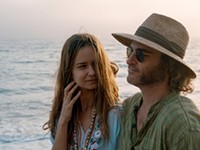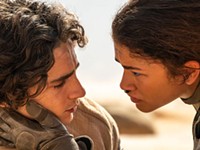[
{
"name": "500x250 Ad",
"insertPoint": "5",
"component": "15667920",
"parentWrapperClass": "",
"requiredCountToDisplay": "1"
}
]
The remote, reclusive Terrence Malick occupies a most unusual position in American cinema as a kind of living anachronism, an artist practicing in a complicated, highly collaborative, labor intensive medium who behaves like some solitary, tormented genius from an earlier time.
After making two highly praised films, Badlands(1973) and Days of Heaven (1978), he lapsed into two decades of silence, finally bringing out the eagerly anticipated Thin Red Line in 1998. In that movie he turned James Jones's gritty short novel about a World War II battle for a Pacific Island into a dreamy Emersonian meditation on nature, innocence, and war, filled with shots of tall grass waving in the wind, rain sweeping in sheets through trees, close-ups of drops of water flowing down ferns, all accompanied by a voiceover commentary laden with the sort of ponderous sentimentality many people mistake for poetic utterance.
His latest work, The New World, unfortunately continues the style and theme of The Thin Red Line, employing the dubious legend of John Smith and Pocahantas to explore once again the contrast between unspoiled nature and corrupt civilization. Malick shows some of the history of the Jamestown colony, the first permanent European settlement in North America, beginning with the arrival of three English ships in 1607 and ending with the death of Pocahantas 10 years later.
He concentrates most of his efforts, naturally, on the relationship between the Indian maiden and the English soldier of fortune, which he depicts as the sort of Edenic idyll that Rousseau and his followers would celebrate a century later.
Apparently concerned with historical accuracy, the director works with natural light and actual locations, duplicating the clothing, tools, and weapons of the early 17th century, and featuring genuine Native Americans playing their ancestors, trained to speak the extinct Algonquin language of the tribe that the English encountered. Typically, he spends much of the film's time dwelling on the purely visual interpretation of his subjects, sweeping his camera through the forests and meadows, shooting at low levels to suggest the movement of people through the wilderness, using a mixture of hand-held cameras and slow motion to impart a weird tension and grace to his battle scenes.
His perfectly commendable emphasis on the visual unfortunately here tends to overpower everything else in the picture, so that he repeats endless scenes of landscapes or shows John Smith (Colin Farrell) and Pocahantas (Q'oriankaKilcher) gazing soulfully into each other's eyes or dancing around in fields for what seems like hours. What the film lacks in dialogue, however, it makes up for in the curious interior monologues he used in The Thin Red Line. The characters speak little to each other, but a great deal to themselves and the audience, almost as if they were delivering soliloquies, uttering their innermost thoughts, many of them of them once again of the moony pseudopoetic variety, without really saying a word, a device that Malick has just about finished off by now.
Although the director apparently indulged himself and no doubt enjoyed the whole process, the actors appear quite uncomfortable most of the time. Even while singing the praises of the noble savages and the Indian way of life --- and sounding very like Kevin Costner in Dances With Wolves --- Colin Farrell looks tense and uneasy, as if he comprehended not at all the point of his character or the story. The newcomer Q'oriankaKilcher, allegedly beautiful and lively, overacts and poses obnoxiously and, strangely, acquires an upper-class British accent in a very short time after meeting John Smith.
Notorious for delays and last-minute alterations --- the movie was supposed to appear in November, for example --- Malick here appears to have edited with an axe, cutting out whole lines of plot that he then papers over with cryptic, artificial exposition. He repeats so many sentimental shots of the lovers and so many phrases of the portentous interior monologues that the long, slow film seems even longer and slower than its actual two hours.
Despite the promise of its subject and the artistry of its director, The New World, finally, is cruelly, punishingly dull, a sort of purgatorial experience that forces the viewer into melancholy contemplation of matters like death and disaster, recollecting all his misdeeds and regrets, penitently enumerating his countless sins, and hoping for some forgiveness.
Leaving the theater, as a result, provides a truly blessed relief.
The New World(PG-13), written and directed by Terrence Malick, is playing at Little Theatres and PittsfordPlaza.
Latest in Movie Reviews
More by George Grella
-

Film Review: "Cake"
Jan 26, 2015 -

Film Review: "American Sniper"
Jan 19, 2015 -

Film Review: "Inherent Vice"
Jan 12, 2015 - More »






